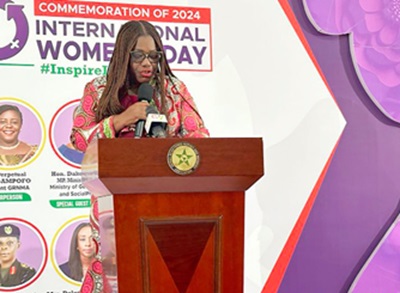
International Women’s Day: Invest in women to accelerate development — Former Gender Minister
A former Minister of Gender, Children and Social Protection, Nana Oye Bampoe Addo, has said investment in women is key to accelerate the development of the country.
Advertisement
This, she says, leads to economic empowerment because it provides women with better employment opportunities and higher wages.
Nana Oye made the remark when she addressed members of the Ghana Registered Nurses Association, to mark this year’s International Women’s Day in Accra.
She said women with at least some formal education were more likely than uneducated women to use contraception and have fewer children saying investing in women’s education additionally had a positive effect on infant and child health.
According to her, a child born to a mother who can read is 50 per cent more likely to survive past age five years and that in Sub Saharan Africa, an estimated 1.8 million children’s lives could have been saved in 2008, if their mothers had at least a secondary education.
Moreover, she said investing in a woman’s education decreased the woman’s risk of contracting HIV or transmitting HIV to her child.
IWD
She said from time immemorial, “we have been seeking a more inclusive world for women; and so the theme for this year’s IWD which is “Invest in Women: Accelerate Progress,” is very apt, adding that “the story of women’s struggle is owned by the whole society; men, women and children, because the future of humanity is in the bosom of the woman, we as nurturers, gatherers, holding up the wellness of our families”.
She said the whole essence of womanhood was a struggle; “a struggle to count women in, stand up and be counted, sit at the table and accelerate gender equality. We are not there yet.
I start with my scorecard and assessment.
We are not there yet.”
“Literally, has there been an investment?
Yes, but not without a struggle, not without advocacy or activism.
Has there been progress?
Some progress, but we are not there yet”.
“There has been a consistent struggle to ensure women’s rights are human rights, that women are treated equally and with dignity, and not as second-class citizens, principally by women for women.
Particularly for us in Africa, this has been a difficult process, mainly due to our socialisation, culture, patriarchal society, the religions we practice, and our traditions,” she said.
She said there were issues of patriarchy, and the subservient nature of marriage and relationships.
The issue of widowhood rites, female genital mutilation (FGM), child marriages, menstruation and other socio-cultural practices that were inimical to the development of women, and “our ability to progress”.
With these limitations in mind, she said, the state, the government, civil society groups, individuals and women themselves have sought throughout history to change the status quo.
To improve the lives of women?
It is a question of what is right; a human right.”
She enumerated some conventions, charters and protocol at the global and regional levels which have been adopted and or ratified, to create a strong normative framework for protecting, realising and respecting women’s rights to include the ratification of the United Nations Convention on the Elimination of All Forms of Discrimination against Women (CEDAW), the UN Convention on Economic Social and Cultural Rights, the African Charter on Human and People’s Rights, the African Charter on the Rights and Welfare of the Child; the Women’s Protocol to the African Charter of ‘the Maputo Protocol’ among others.




